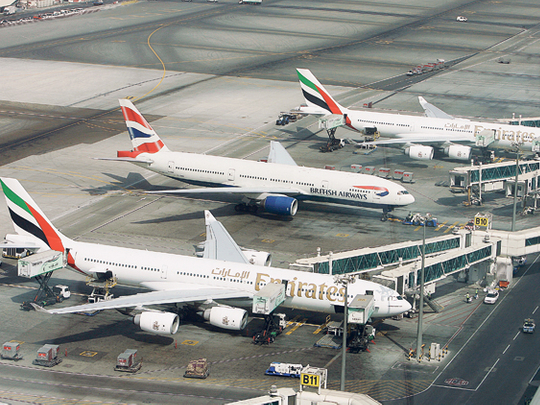
Dubai: A scheme to limit the tonnes of CO2 emitted by airlines flying to the European Union will not affect the UAE's national carriers as they claim they are already meeting the targets ahead of the 2012 deadline.
According to experts in emissions trading, quantifying how much CO2 airlines emit annually is very difficult. Estimates peg it at anywhere between 5 to 15 millions tonnes of CO2 per annum for the larger operators.
External verification of emissions is a requirement of the regulations to ensure that data submitted is transparent and complete. The British Standards Institute (BSI) has been providing verifications against European Union Emissions Trading Scheme (EU ETS) since the scheme started in 2005.
"Our aim is to work closely with airlines and tailor our verification approach to suit their requirements and therefore we would urge airlines to engage with the verification bodies as early as possible in 2010," said Theuns Kotze, Regional Director, BSI.
The EU committed to cutting its emissions by eight per cent from 1990 levels by 2012 under the Kyoto protocol through EU ETS. It was later decided the aviation sector should be included.
Comparisons
Paul Zissermann, Emirates' manager, environmental affairs, said Emirates is already compliant with the EU ETS requirements.
"Our overall fuel efficiency and emissions are already more than 25 per cent better than the International Civil Aviation Organisation [ICAO] global fleet average," he said.
The Emirates fleet has an average fuel burn of less than four litres for every 100 passenger kilometres that fly.
"This is better than most small cars. Emirates strongly supports the efforts … in the industry for a global scheme based on a sectoral approach, where aviation pays for its emissions only once, instead of a complex system of overlapping emissions trading schemes, regional taxes and levies. For example, the UK government has stated that the moneys raised by the EU ETS will not be put back into climate change projects or research and development into aviation and biofuels," said Zissermann.
The UN International Panel on Climate Change (IPCC) holds the aviation industry accountable for 2 per cent of worldwide CO2 emissions from fossil fuel use, which could reach 3 per cent by 2050.
However carbon offsetting options are not available to Emirates or Etihad passengers when buying tickets.
"We strongly believe in the ‘polluter-pays principle', as such, we — as the aircraft operator — are responsible for minimising our emissions, instead of simply passing this responsibility on to our customers … For those of our customers who voluntarily want to offset their travel-related emissions, we can refer them to one of the world's leading carbon offset organisations," he said.
Proportions
Transport in general accounts for 23 per cent of global greenhouse gas emissions, behind the power and land use sectors and the same as the agriculture sector, according to the IPCC. Aviation is responsible for 12 per cent of CO2 emissions from all transport sources, compared to 76 per cent from road transport.
Linden Coppell, head of environment, Etihad Airways, said in a statement: "While we prefer a global rather than regional approach to reducing emissions, Etihad Airways is in full compliance with the EU scheme. We have submitted the required plans to our designated regulator, the UK Environment Agency, and started gathering the requested data for the EU ETS on January 1, 2010 We will submit that data on the due date of March 31, 2011. Etihad will continue to make use of our partnership with our partners at Masdar and specifically the Masdar carbon management unit, in helping to assess our future allowance needs."
Etihad is also working on a Sustainable Bioenergy Research Project (SBRP) with the Masdar Institute of Science and Technology, Boeing and Honeywell's UOP to develop a commercially viable biofuel for aviation.












